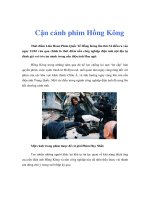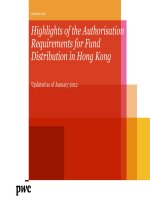Ecotourism in hong kong
Bạn đang xem bản rút gọn của tài liệu. Xem và tải ngay bản đầy đủ của tài liệu tại đây (2.1 MB, 41 trang )
Ecotourism - Theory and Practice
Mr. Cheng Wing Ming, Clement
Tour 2004-2005
(Jointly organized by Department of Chinese
History, Department of Geography, Green
Club, )
Play a game first
• />/eco2b.html
Outline
•
•
•
•
•
•
•
Tourism industry
What is ecotourism?
Why ecotourism in Hong Kong?
Potentials
Constraints
Ecotourism Planning
Conclusion
Tourism Industry
• Planet’s biggest industry
• Annual turnover HK$31 trillion
• An economy second in the world after
USA
• Globe’s biggest employer, 10% of the
workforce
Tourism Industry in Hong Kong
• 9th top tourism earner in the world
(WTO 1999)
• Tourists spent HK$53 billion in 1999 (HKTA
1999)
• Highest tourism receipts and arrivals in East
Asia / Pacific region in 1997 (excluding
China)
Tourism Industry in Hong Kong (cont’d)
--- Visitor Distribution in 1999 --Country / Region
Mainland
Taiwan
East Asia
Japan
Europe
USA
Australasia
Canada
Others
Total
Visitors (1,000s)
3,084
2,000
1,260
1,020
939
803
329
211
1,033
10,678
% Total
28.9
18.7
11.8
9.6
8.8
7.5
3.1
2.0
9.6
100
Tourism Industry in Hong Kong (cont’d)
--- Tourists’ perception of Hong Kong --Tourism Category
Oriental culture
Shopping paradise
Heritage
Natural landscape
Stopover to China
Feng Shui
Theme parks
Horserace
Others
Source: Vinci Li (2000)
% Total
31.4
24.4
13.5
9.6
9.6
4.5
3.8
1.3
1.9
What is ecotourism?
• Ceballos-Lascusain (1987)
“Travelling to relatively undisturbed or
uncontaminated natural areas with the specific
objectives of studying, admiring and enjoying
the scenery and its wild plants and animals, as
well as any existing cultural manifestations (both
past and present) found in the areas……while
producing economic opportunities that make the
conservation of natural resources financially
beneficial to local citizens.”
What is ecotourism? (cont’d)
• Australian Commonwealth Department of
Tourism (2010)
“Nature-based tourism that involves
education and interpretation of the
natural and cultural environment and
ecologically sustainable management of
natural areas.”
Components of ecotourism
•
•
•
•
•
Nature-based component
Environmentally-educative component
Sustainable management
Ecotourism ethics
Economic benefits
Nature-based component
• Wildlife including species, habitat,
landscape, scenery and water features
• Camping, hiking, picnicking
• Nature-based tourism not necessarily
ecotourism
• Leaving nothing but footprints and taking
nothing but photos
Environmentally-educative component
• Enhance knowledge and foster positive
attitudes of participants towards
environmental conservation (Bottill and
Pearce 1995)
• Management strategy (Orams 1995)
Behaviour
Enjoyment
Increasing success
satisfaction
of strategy
lifestyle
change
Sustainable management
• Green tag vs environmental disruption
• Ecotourism market vs nature-based and
educative dimensions
• Sustainable tourism not necessarily
ecotourism
• Green management measures
(minimize fuel and energy consumption,
effective waste disposal, waste recycling,
educational, minimize impacts, etc.)
• Ecologically sensitive, economically viable,
culturally appropriate (Wall 1997)
Ecotourism ethics
• Ecotourists vs mass tourists
• Shallow ecotourism vs deep ecotourism
• Ecotourists are motivated individuals with
specific values, attitudes and behaviour
towards nature
• Foster a positive attitude towards natural
environment
Passive
Minimize
disturbance
to environment
Increasing success
of strategy
Active
Actions that can
enhance ecosystem
health
Ecotourism Today
• Buzzword
• Utopia in the tourism domain
• Fastest-growing sector of tourism industry,
swelling by 20% a year
• Growing fastest in developing countries with
“natural wonders”
• “Dyed-green” package trips
Why ecotourism in Hong Kong?
• Earth Summit on Environment in 1992
• Decline in tourists
1997
10,408,000 visitors
1998
9,575,000 visitors
• Development of new tourist attractions
(Disneyland Theme Park, Lantau Cable Car,
Wetland Park, etc.)
• Lack of an interpretative dimension in our
country parks
• Concerted effort of HKTB, AFCD, NGOs and
tourist agencies
Group Discussion
• Does Hong Kong possess enough tourist
attraction to develop ecotourism?
Potentials (nature-based perspective)
• Country Parks
Potentials (nature-based perspective)
• Country Parks
Potentials (nature-based perspective)
• White dolphin watching
Potentials
(nature-based
perspective)
• Nature Walks
Potentials (nature-based perspective)
• Marine Parks
Potentials (nature-based perspective)
• Mai Po Nature Reserve
Potentials (nature-based perspective)
• Tai Po Kau Nature Reserve
Constraints
(Stakeholders’ perspective)
• Hong Kong Tourism Board(HKTB)
• Advisory body without statutory power
• Specializes in marketing approach instead of
proactive and sustainable management
tactics
• Need of a new government department for
tourism (or restructuring)
• Emphasize on the development of mainland









